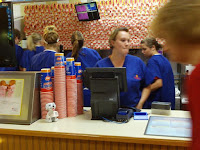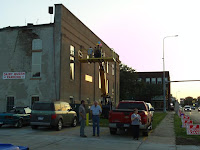When I blog about Miracle Treat Day at the Madison Dairy Queen, I try hard not to politicize the event. Madison DQ owner DeLon Mork and his crew continue to lead the nation in making the fundraiser a success: the store
sold 20,955 21,405* Blizzards for the Children's Miracle Network on Thursday. Dairy Queen and the community do good for sick kids and their families—that's the main story, and all the story there needs to be.

Patience is a virtue: the line for Blizzards at 7:30 p.m. snakes around the entire inside of the Madison DQ and out the door to the sidewalk.
But if we want to broaden our focus—and I think we can without doing injustice to the event itself—the success of Miracle Treat Day in Madison has some lessons for creative community development in our small town and other rural communities.
I think a lot about how Madison and other small towns can throw successful cultural events that enliven our downtown. I don't have to think that hard: the Madison Dairy Queen pretty much shows a small town how to throw a party. What do we learn about staging good community cultural events from Miracle Treat Day?

Busy behind the counter: Madison Dairy Queen runs at full staff and then some during Miracle Treat Day
South Dakota has bigger Dairy Queens with more seating, more counter space, and kitchen space. That hasn't stopped DeLon and his crew from increasing sales and turnout each of the five years they've done Miracle Treat Day. Staff work shoulder to shoulder behind the counter; customers wait shoulder to shoulder at the counter and in the line that snakes through the entire store and out to the sidewalk. Customers wait patiently. Midwesterners overcome their customary outsized prairie bubbles and accept some Manhattan-style crowdedness for a few minutes.
You can do more with your space than you think.
Parking is everywhere: folks parked a block or more away up Harth Avenue to come get Blizzards and enjoy the music.
There's no way the Madison DQ parking lot could hold all the people who come to the store on Miracle Treat Day, let alone everyone who comes to listen to the music and bring their kids for the games on adjoining Harth Avenue. If you don't have a big parking lot for the community event you're planning, do you give up? No. You make it big enough and good enough that people will be willing to walk. I saw cars parked up and down Harth Avenue Thursday night... about as far as people walk to cross the parking lot to Hy-Vee or Wal-Mart in the big city. People walk a lot farther to get to the
Brookings Summer Arts Festival.
Don't sweat parking! Throw a good enough event, and people will burn shoe leather to get there.

Madison police direct traffic on Highway 34 outside the Madison Dairy Queen. Note the signs and the fire truck boom, getting drivers' attention from blocks away so they know they'll need to slow down.
All those visitors mean drivers will see something they aren't used to in a small town: lots of people walking around, enjoying themselves, and taking up valuable space on the sidewalks and the streets. We rural drivers get used to thinking of stop signs as the only obstruction to our unimpeded travel. The streets sometimes figure in our psyche as inviolable spaces for machines only.
Nuts to that. Plan that big event. Get the city to barricade a block or two. Draw a crowd that spills over from the sidewalk to the boulevard to the street. Get a couple city cops to come direct traffic. Trust me: if your town is Madison or any similar size, the police aren't too busy to come help. Besides, what more logical place for the police to do their job of protecting the public than the big event where you've got the biggest concentration of the public? Put up the signs, get drivers' attention, slow them down, remind them that the streets belong to the entire community, not just people in cars.
Solve problems. The bigger your plan, the more moving parts you install, the more unforeseen problems you'll have. This is not a reason to plan small. This is a reason to think ahead, brainstorm anything and everything that could go wrong... and still be ready to come up with solutions when the problems you inevitably can't foresee arise. Don't be scared: be excited! A big event is a chance to say,
bring it on! I can fix anything!
Madison Masonic Temple gets a new elevator... with a view!
Consider Thursday: M.O.B. thought it would be cool to play some music from the roof of the Masonic Temple across from the Dairy Queen. DQ owns the temple, and DeLon said, "Sure, why not?" But dang—how do we get the band's equipment up there? Call a friend with a telehandler.
Problem solved! and that great old vacant building gets its first practical use in years. Beautiful.
Oh, but wait! The music was great, but situated right across the parking lot, the music drowned out the drive-up mic. The gals in the store couldn't hear drivers' orders. Oh no! What do we do? Shut down the music? Tell Michael Hope to go acoustic?
No, we
solve the problem. The drive-up gal has a headset, right? Send her outside to take orders face to face. Radio the orders inside—boom, problem solved. We keep the music going, the store provides even more personal service with a smile... and at least one lucky DQ gal gets to step out from behind the crazy counter and get some sunshine and fresh air.

Madison Dairy Queen, Miracle Treat Day, August 5, 2010.
I hear lots of folks talk about how you can't make a street dance or a concert fly if you don't have alcohol. Everyone knows I'm a teetotaler, so I don't need to belabor my disgust with the "gotta have booze" mindset. Let me just remind everyone that there's not a drop of alcohol at Miracle Treat Day, and it's one of the busiest, bubbliest downtown events Madison has.
Bring downtown alive. This is the big takeaway. People want to see their community alive and vibrant. They like the transformation of a normal everyday street into a noisy, bustling place filled with music and neighbors. Give them a reason to come sit outside where they can see and be seen. Find a way to make your downtown into a gathering place. ----------------------
Update 2010.08.10: DeLon called and said they "found" 400-some more Blizzards sold on Thursday, raising the total from the originally reported 20,955. Another lesson for planning a good event: always double-check your spreadsheets! :-)






 This blog printed on 100% recycled electrons.
This blog printed on 100% recycled electrons.















